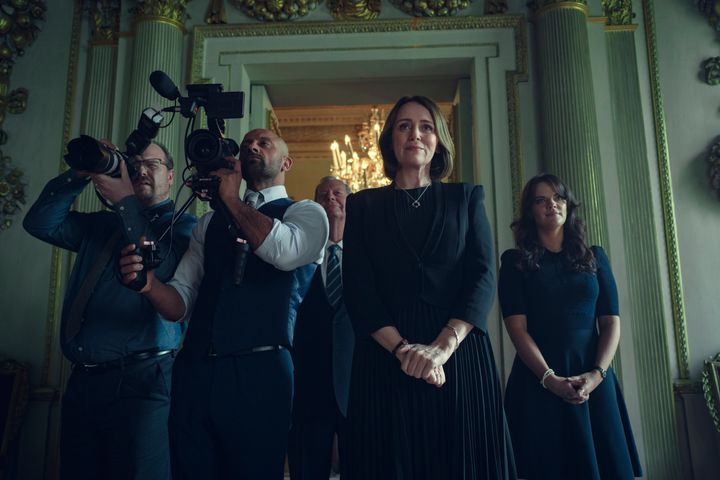Why is the British royal family so bad at PR?
It’s not a new question. But it has been particularly top of mind since “Kategate” ― the cauldron of conspiracy theories that began to boil over in recent weeks, after Kate Middleton, Princess of Wales, had not been seen in public since December.
As we’d later learn, when Kate announced on March 22 that she has cancer, it was an extraordinarily fraught situation. But at every turn, Kensington Palace’s antiquated public relations apparatus made it even worse, allowing unhinged rumors to fill the information void (including when palace officials threw the princess herself under the bus with her botched photo-editing job). The royals’ longstanding PR policy is to say as little as possible and try to ride out the storm. Sometimes, though, they don’t appear to realize it’s a Category 5 hurricane. It’s an approach that feels stuck in the pre-internet and pre-social media age.
In the four years since they effectively left the family, Prince Harry and Meghan Markle, the Duke and Duchess of Sussex, have criticized “the firm” and raised some serious allegations against the royals’ PR apparatus. (In a bombshell 2021 interview, Oprah Winfrey infamously asked Meghan if she was “silent or silenced.”) On screen, the behind-the-times nature of the palace was a recurring theme in the later seasons of Netflix’s “The Crown.”
Now, these questions also underpin “Scoop,” a coincidentally timely Netflix film that premieres Friday. Though it deals with a vastly different royal-related news firestorm, it resurfaces a lot of the same confounding impressions about the palace’s PR operation and its disconnect from the modern world.
“Scoop” is a dramatization of how the team at BBC’s “Newsnight” landed a blockbuster 2019 interview with Prince Andrew. That year, Andrew (played here with unsettling unease by Rufus Sewell) faced mounting pressure to address his highly suspect friendship with serial sexual predator Jeffrey Epstein. As the film depicts, he agreed to an exclusive interview with veteran host Emily Maitlis (played with typical panache by Gillian Anderson), in the hopes it would put the matter to rest.
Not to put too fine a point on it, he shat the bed, appearing woefully out of touch and entitled and demonstrating little if any remorse. With each squirmy answer, Andrew dug himself into a deeper hole. He said his long association with Epstein “let the side down”; he explained that he stayed at Epstein’s mansion, even after the financier was convicted of sex crimes and became a registered sex offender, because it was “a convenient place to stay”; and he denied he met Epstein’s accuser Virginia Giuffre because that same day, he had taken his daughter to a chain pizza restaurant, which was, for him, “an unusual thing to do.”
“Scoop” pulls back the curtain and centers the trio of women involved in the interview: Maitlis, producer Sam McAlister (an excellent Billie Piper), and Amanda Thirsk (an also excellent Keeley Hawes), who was Prince Andrew’s top aide at the time. The film is a solid journalism procedural, no bells and whistles required. At an hour and 40 minutes, it’s doing exactly what it needs to do: no more, no less. In an era when studio and streaming executives turn seemingly everything with a narrative arc into a limited series, whether it needs to be or not, the film’s restraint and concision are admirable. (Amazon has a forthcoming three-episode limited series on this saga as well, starring Ruth Wilson as Maitlis and Michael Sheen as Andrew.)
The backdrop of “Scoop” is one that journalists on both sides of the Atlantic can painfully relate to: impending layoffs at the BBC. With their jobs potentially on the chopping block, the staffers at “Newsnight” don’t have time to chase stories with a longer tail, instead being forced to cave to deadline pressure. Sam is digging around to figure out a way to land a Prince Andrew interview. But there’s no timely or particularly newsworthy reason to justify her efforts — in journalism-speak, no news peg.
When Epstein is arrested, Sam finally gets her peg. The silence from Prince Andrew and the ensuing information vacuum have become too big to ignore. At this point, you can likely predict most of the film’s narrative beats: a three-act structure of landing the interview, preparing for it, and conducting it, with portions recreated for the Netflix audience. Despite the staid format, the film will make you appreciate the art of a blockbuster television interview. Even if you know how this all ends — Prince Andrew squirming his way through the exchange, mangling his reputation beyond repair — it’s still pretty riveting.

What’s most astonishing is what “Scoop” resurfaces about the royal officials’ PR strategy and their jaw-dropping naïveté and lack of foresight. At the film’s outset, when Sam first contacts Amanda in the hopes of greasing the wheels for a potential interview, Amanda’s strategy has simply been to try to ride out the matter, not recognizing it’s already bigger than she thinks. Noticing that Andrew is apparently charming (pretty questionable, according to the film) in face-to-face interactions with palace visitors, Amanda sets him up with reporters for off-the-record meetings, hoping this will take care of things.
But as Sam tells her: “You can’t go ‘no comment’ on being friends with a pedophile and expect everyone to love you, whoever you are.” It’s telling that this was not already self-evident to Amanda.
When Andrew agrees to meet with the “Newsnight” team to discuss a potential interview, Sam spells out the stakes, describing how the public thinks of Andrew as a sleazy playboy, a sordid reputation recirculated and cemented on the internet.
“‘Never complain, never explain’ ― but I’m afraid those days are over,” she says. “Yes, everyone has a voice now: social media, Facebook, Twitter. Everyone’s having their say, and what they’re saying about you is a lot stronger than anything I just said.”

Once again, it’s puzzling that no one inside the palace seems to understand the magnitude of Andrew’s public relations nightmare. Crisis management 101: Be aware of your client’s reputation.
It’s a strange paradox. The royals somehow remain relevant, with the public thirsty for news of their whereabouts and drama. At the same time, their antiquated ideas about what to share with the masses, and how, only serve to weaken their importance to the world outside the palace. And the internet — one of the instruments they try hardest to ignore — is doing more than anything to keep their relevance alive.
What will it take for their public-facing strategy to at least acknowledge the modern world? Another global-scale PR blunder, perhaps.
“Scoop” premieres on Netflix Friday.
Need help? Visit RAINN’s National Sexual Assault Online Hotline or the National Sexual Violence Resource Center’s website.
Disclaimer: The copyright of this article belongs to the original author. Reposting this article is solely for the purpose of information dissemination and does not constitute any investment advice. If there is any infringement, please contact us immediately. We will make corrections or deletions as necessary. Thank you.
